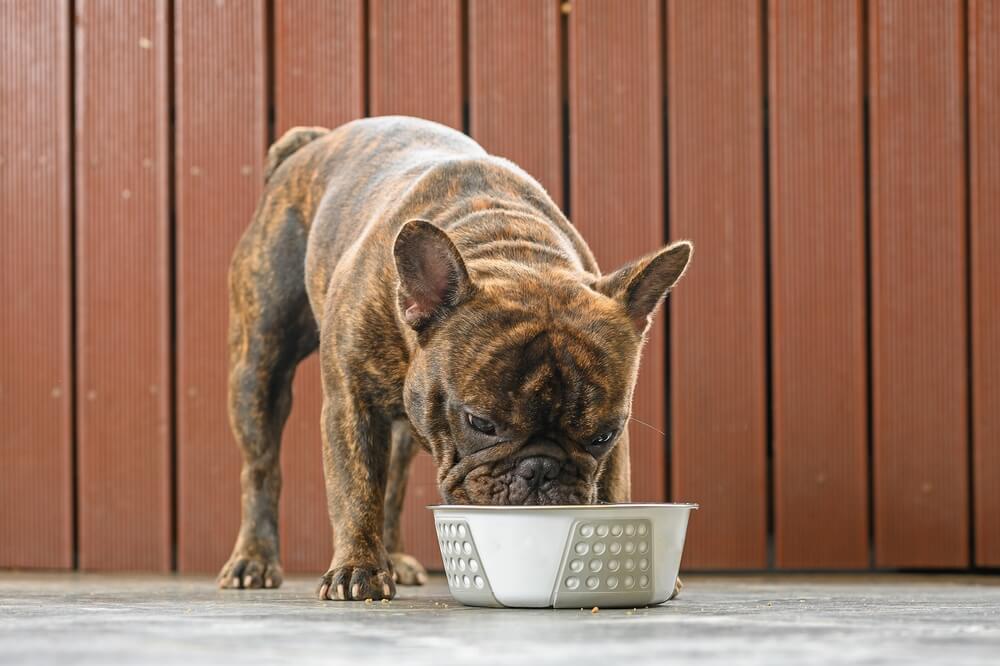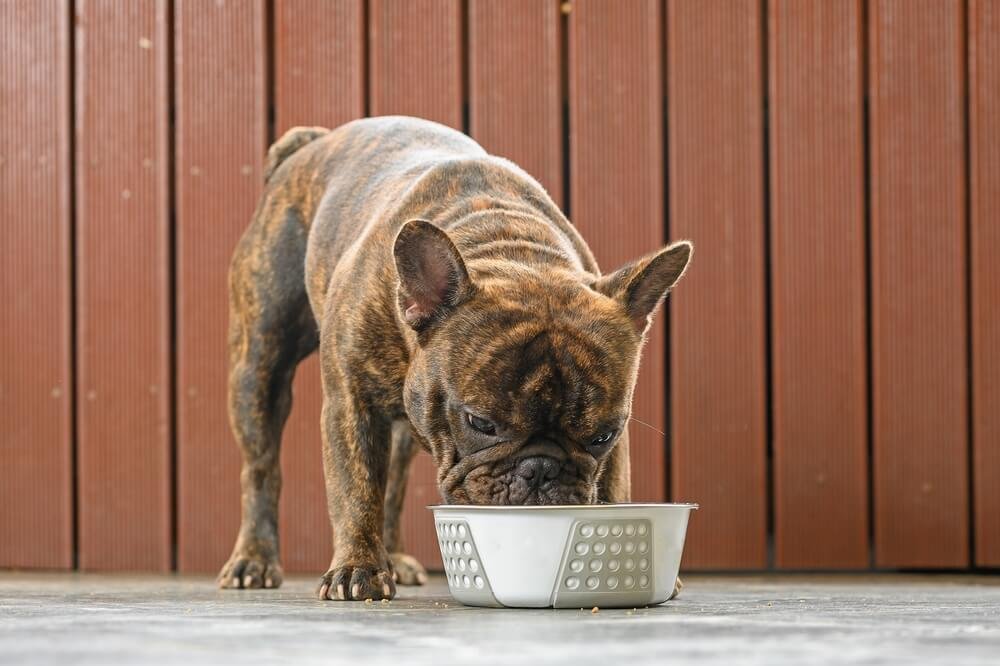When it comes to mealtime, French Bulldogs have a unique approach to eating that sets them apart from other breeds. Unlike some dogs that gobble down their food in seconds, French Bulldogs are known for their slow and deliberate eating style. This is due to their brachycephalic, or short-nosed, structure which can make it more difficult for them to chew and swallow quickly. So, if you ever find yourself wondering why your French Bulldog takes their time while eating, it’s all thanks to their adorable little faces!
In addition to their unique eating style, it’s important to understand the specific dietary needs of French Bulldogs. These lovable pups require a balanced diet that is rich in high-quality proteins, healthy fats, and essential nutrients. It is recommended to feed them a combination of dry kibble and wet food to ensure they receive all the necessary nutrients. It’s also crucial to monitor their portion sizes and avoid overfeeding, as French Bulldogs are prone to weight gain and obesity. By providing them with a nutritious and portion-controlled diet, you can help keep your French Bulldog happy, healthy, and satisfied at mealtime.
French Bulldogs have a unique eating style due to their short noses and compact jaws. To help them eat comfortably, it’s best to provide them with smaller, bite-sized portions of food. Avoid feeding your French Bulldog from elevated bowls, as this can contribute to gas and bloating. Additionally, make sure to stick to a regular feeding schedule and monitor their weight to prevent obesity. Always consult with your veterinarian for specific dietary recommendations.

The Eating Habits of French Bulldogs
French Bulldogs are known for their adorable looks and friendly nature. As dog owners, it’s crucial to understand how they eat and what dietary habits are best for them. In this article, we will explore the eating habits of French Bulldogs and provide you with essential information to ensure that your furry friend eats healthily and happily.
1. Feeding Schedule
Establishing a regular feeding schedule is vital for French Bulldogs. Most experts recommend feeding them two to three times a day. This ensures that they receive the necessary nutrients and energy throughout the day without overeating. It’s best to divide their meals evenly, spacing them out in the morning, afternoon, and evening. A consistent feeding schedule helps regulate their digestive system and prevents them from becoming hungry or overeating.
When developing a feeding schedule for your French Bulldog, consider their age, size, activity level, and any specific dietary requirements recommended by your veterinarian. Puppies may require more frequent meals, while adult dogs may be fine with two meals a day. Always consult with a professional to determine the ideal feeding schedule for your furry friend.
2. Choosing the Right Food
The quality of food you choose for your French Bulldog is crucial for their overall health and well-being. Opt for high-quality dog food that is specifically formulated for small breeds. Read the ingredient list carefully and avoid foods that contain fillers, artificial preservatives, and meat by-products. Look for a well-balanced diet that includes real meat, vegetables, and essential nutrients.
If you are unsure about which brand or type of food to choose, consult with your veterinarian. They can provide recommendations based on your French Bulldog’s specific needs, such as weight management or food allergies. Remember to transition your dog’s food gradually to prevent digestive upset. Mix a small amount of new food with their existing food and gradually increase the ratio over a week.
3. Portion Control
Portion control is essential to prevent obesity and maintain a healthy weight for your French Bulldog. Follow the feeding guidelines on the food packaging or consult your veterinarian for the appropriate portion size based on your dog’s age, weight, and activity level. French Bulldogs are prone to weight gain, so it’s important not to overfeed them.
Avoid leaving food out all day for your French Bulldog to graze on. This can lead to overeating and weight gain. Instead, offer their meals at specific times and allow them a set amount of time to eat. If your French Bulldog doesn’t finish their food within 15-20 minutes, remove the remaining portion to prevent ants or other pests from being attracted to it. Monitoring their portion sizes and adjusting as needed will help maintain their healthy weight.
4. Slow Feeding Techniques
French Bulldogs, like other brachycephalic breeds, can be prone to eating too quickly. Eating too fast can lead to gastrointestinal issues, such as bloating and gas. To prevent this, consider using slow feeding techniques such as puzzle feeders or slow feeder bowls. These options require your French Bulldog to work for their food, slowing down their eating pace and promoting healthy digestion.
Another technique to slow down their eating is to place a stainless-steel ball or a large rock in their food bowl. This forces them to eat around the object, preventing them from gulping down their food. Supervise your French Bulldog during mealtime to ensure they do not chew or swallow the object.
5. Hydration
Ensuring that your French Bulldog stays properly hydrated is essential for their overall health. Provide fresh, clean water at all times, and make sure to change it regularly. French Bulldogs can be susceptible to overheating due to their brachycephalic nature, so it’s important to monitor their water intake, especially during hot weather or after physical activity.
If your French Bulldog doesn’t seem interested in drinking water, try adding a small amount of water to their food to increase their liquid intake. You can also consider using a pet water fountain, as the flowing water may be more enticing for them to drink.
Summary
In conclusion, French Bulldogs should be fed on a regular schedule and provided with high-quality dog food that meets their nutritional needs. Portion control and slow feeding techniques can help prevent overeating and digestive issues. It’s important to monitor their water intake to ensure proper hydration. By following these guidelines, you can ensure that your French Bulldog stays healthy and happy.
Key Takeaways: How Do French Bulldogs Eat?
- French Bulldogs should be fed high-quality dog food specifically formulated for their breed.
- They have a tendency to overeat, so it’s important to measure their food portions and avoid free-feeding.
- Slow feeder bowls can help prevent them from gulping down their food too quickly.
- French Bulldogs are prone to obesity, so it’s crucial to maintain a balanced diet and provide regular exercise.
- They may require special feeding techniques, such as elevating their food bowls to help with digestion and prevent choking.
Frequently Asked Questions
Dogs have their unique eating habits and preferences, and French Bulldogs are no exception. As a pet owner, it’s important to understand how French Bulldogs eat to ensure they receive proper nutrition and maintain a healthy eating routine. Here are some commonly asked questions about how French Bulldogs eat:
1. How should I feed my French Bulldog?
When feeding your French Bulldog, it’s important to establish a consistent feeding schedule and portion size. Most French Bulldogs do well with two meals a day, one in the morning and one in the evening. You can choose to feed your Frenchie either dry kibble or wet food, depending on their preferences and any dietary restrictions recommended by your veterinarian. Make sure to provide fresh water at all times.
It’s also advisable to avoid feeding your French Bulldog human food, especially foods that are toxic to dogs, such as chocolate, onions, garlic, and grapes. Stick to high-quality dog food that is specifically formulated for French Bulldogs, as it meets their nutritional needs and promotes good health.
2. Should I use a slow feeder for my French Bulldog?
Using a slow feeder for your French Bulldog can be beneficial, especially if they tend to eat too quickly. Fast eating can lead to digestive issues, choking, and even weight gain. Slow feeders are designed with maze-like patterns or raised obstacles to slow down your Frenchie’s eating pace. This helps them savor their food and reduces the risk of gulping down large amounts at once.
If your French Bulldog is a fast eater, consider using a slow feeder to promote better digestion and prevent potential health issues. However, it’s always best to consult with your veterinarian for personalized advice based on your dog’s eating habits and specific needs.
3. Are there any special considerations for French Bulldogs with food allergies?
French Bulldogs, like other dog breeds, can develop food allergies or sensitivities to certain ingredients. Common allergens for dogs include chicken, beef, dairy, wheat, and soy. If you suspect your Frenchie has food allergies, it’s important to consult with your veterinarian for proper diagnosis and guidance.
Your veterinarian may recommend an elimination diet to identify the specific food allergens. They may also suggest switching to a specialized hypoallergenic dog food that excludes the common allergenic ingredients. The right diet for your French Bulldog with food allergies can help alleviate symptoms like skin rashes, ear infections, and gastrointestinal discomfort.
4. Can I give my French Bulldog treats?
Treating your French Bulldog can be a great way to reinforce positive behavior and strengthen the bond between you. However, it’s important to choose treats that are safe and nutritious for your Frenchie. Opt for small, bite-sized treats that are specifically formulated for dogs, avoiding treats that contain excessive sugar, salt, or artificial additives.
It’s also crucial to moderate the amount of treats you give to your French Bulldog. Treats should not exceed 10% of their daily calorie intake to prevent weight gain and maintain a balanced diet. Consult with your veterinarian for suitable treat options and proper portion sizes based on your dog’s age, size, and activity level.
5. How can I help my French Bulldog with a sensitive stomach?
French Bulldogs, like humans, can sometimes have sensitive stomachs that can lead to digestive issues, such as vomiting or diarrhea. If your Frenchie has a sensitive stomach, there are a few steps you can take to help alleviate their discomfort.
Firstly, make sure you are feeding your French Bulldog a high-quality, easily digestible dog food. Look for options that contain limited ingredients and avoid common allergens. Additionally, avoid sudden changes in their diet and opt for gradual transitions when switching their food.

French Bulldogs eat like most dogs, with some specific considerations due to their brachycephalic (short-faced) structure. They should be fed a balanced diet with high-quality dog food specially formulated for their needs.
It’s important to split their meals into smaller portions throughout the day to prevent overeating and obesity. Additionally, they should eat in a calm environment and not engage in vigorous exercise immediately before or after meals to prevent digestive issues. Lastly, it is crucial to provide them with fresh water at all times.
